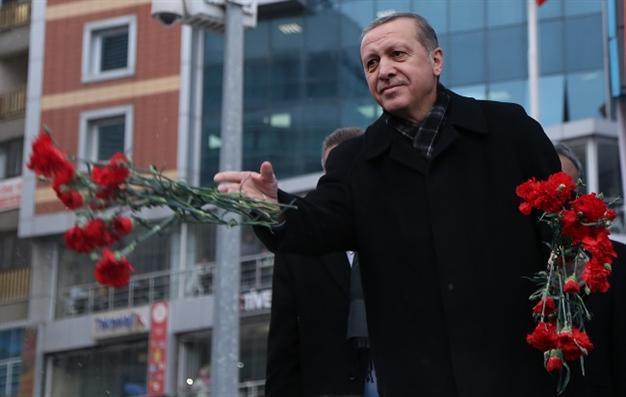Security bill to pass one way or another: Erdoğan

Turkey should shift to the presidential system from the current parliamentary system, President Erdoğan says once again while addressing citizens in Elazığ. AA photo
A security bill that has precipitated fisticuffs in parliament and protests on the street will pass come hell or high water, President Recep Tayyip Erdoğan has promised.
“[The opposition deputies] are stalling it. Don’t do so,” Erdoğan said as he addressed a crowd in the eastern province of Elazığ on Feb. 20. “Your duty is to make these laws in parliament, not to block them. One way or another, this code will pass.”
The president also criticized the fistfights in parliament’s General Assembly, presenting it as a reason to shift from the current parliamentary system to a presidential system.
“Look what is happening in parliament these days. Is this appropriate?” he asked. “You have elected your brother in person, not via deputies.”
Erdoğan become Turkey’s first elected president after the Aug. 10 polls last year. Citizens will head for the ballot boxes once again on June 7 for the parliamentary elections to pick the prime minister.
Erdoğan argues that this is an opportunity to grant his former Justice and Development Party (AKP) enough deputies, at least 330 of 550 seats, to unilaterally change the system.
“This code, which is set to take bold steps in protecting peace and freedoms in the country and struggle against drugs, will inshallah pass in parliament one way or another,” Prime Minister Ahmet Davutoğlu said, repeating Erdoğan’s stance, while addressing a crowd in the Central Anatolian province of Sivas.
Those who have turned parliament into a venue for violence cannot account for it, he said, apparently referring to the opposition. even though one of his deputies boasted on TV program at having punched Peoples’ Democratic Party (HDP) deputy Ertuğrul Kürkçü “four or five times.”
The government says the code was against drugs and those who provoke or use violence in street demonstrations.
Opposition parties earlier this week vowed to stop the draft text from coming to the parliament floor by resorting to delaying tactics such as presenting motions on unrelated subjects.
Turkey’s opposition fears the government-led bill will effectively create a police state.
MP falls down the stairs
Parliament descended into fresh chaos late Feb. 19 with lawmakers exchanging punches for a second time over the bill.
Before speeches on the bill began on Feb. 19, opposition parties voiced objections for more than three hours. In their objections, they argued that there was a contradiction with both the parliament’s internal regulation and the Constitution in regards to the shape and content of the bill.
With fists and kicks flying in the hall, CHP deputy Orhan Düzgün engaged in a battle with AKP deputy Suat Önal.
Düzgün fell down the stairs which are used by stenographs to descend to a lower floor.
Düzgün rolled down to the lower floor, leading other CHP deputies to panic. While some CHP deputies were pressing against AKP deputies, some other CHP deputies were trying to rescue Düzgün from the place where he fell down. The fight stopped only after great efforts by the executives of the parties.
The unruly scenes mirrored those seen in the parliament overnight Feb. 17 to Feb. 18, when five deputies were left injured.
Interior Minister Efkan Ala justified the bill by referring to the EU Progress Report on Turkey for 2014 which stated that “reforms are needed to improve civilian scrutiny of the military, the police, the gendarmerie and the intelligence services.”
Speaking at a joint press conference along with EU Minister Volkan Bozkır, Justice Minister Bekir Bozdağ and Foreign Minister Mevlüt Çavuşoğlu after they held a meeting of the Reform Action Group (REG) on Feb. 20, Ala especially referred to a contentious arrangement in the draft which gives the highest administrative officer of a province, the governor, authority. Ala cited a sentence in the report which said “in particular, civilian oversight by governors of the Turkish gendarmerie’s law enforcement activities remained insufficient.”
“There are arrangements which increases civilian oversight of the gendarmerie, the police department and the coast guard and which affiliates the gendarmerie and the coast guard with the Interior Ministry. Aren’t the civilian will and administration needed to be authorized so that the one who is responsible for maintaining public order fulfills that responsibility in the way the citizen wants? What can be more natural than that? This is a delayed reform,” Ala said.
